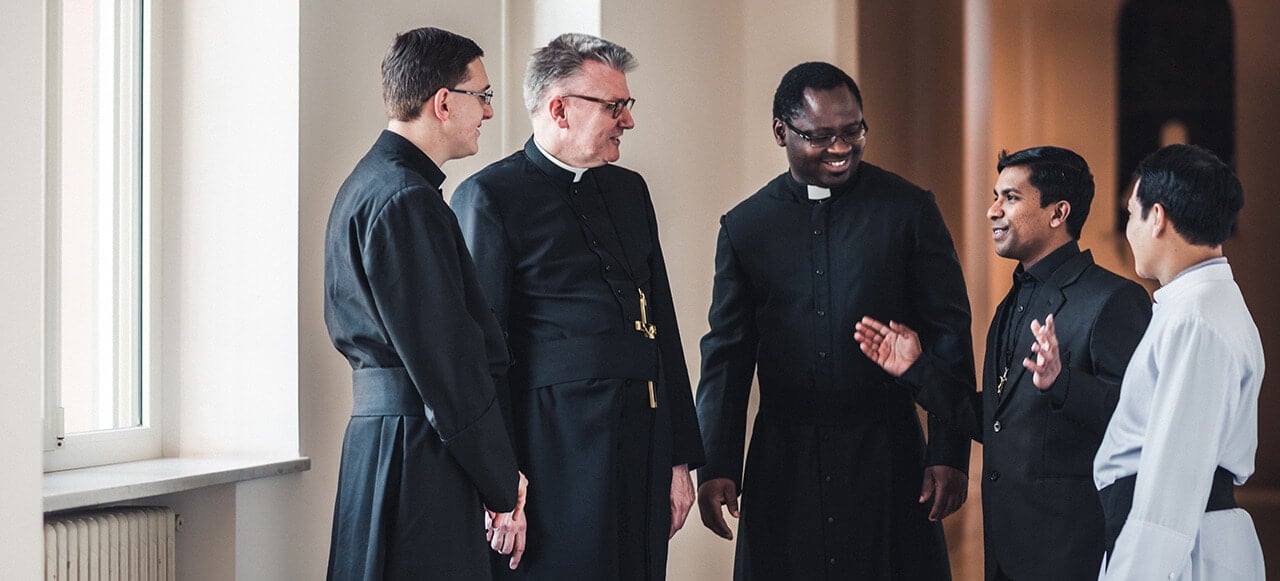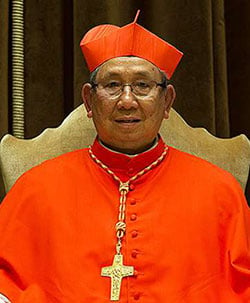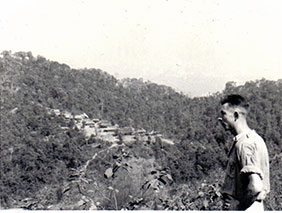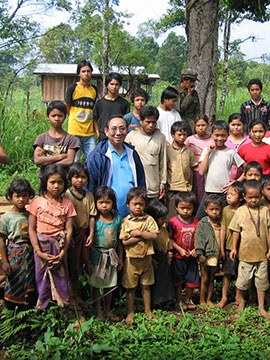On Sunday, May 21, 2017 – Feast of Saint Eugene de Mazenod – Pope Francis surprised us by announcing the creation of five new “untypical” Cardinals. Among them is Bishop Louis-Marie Ling Mangkhanekhoun, one of the three bishops of Laos.
Mgr. Louis-Marie Ling is well-known to the Oblates. Born in Ban Na Louang, the village of the Kmhmu’ minority – a people whom the Oblates had just begun to evangelize – he was baptized and educated by the Oblate team of Xieng Khouang. The priests whom he knew as a child were Oblate missionaries from France.
- Your Eminence, what was your immediate reaction when you heard that you were chosen a cardinal by Pope Francis?
It came as a complete surprise to me. Even when I was appointed a bishop, I was surprised, because I was determined all my life to serve as a priest and not as a bishop. However, you cannot refuse God’s call to service. Therefore, the call to be a cardinal was even more surprising.
Somebody called me to the phone and said “Congratulations Bishop, you have been chosen a cardinal by the Pope!” I said, “I don’t believe you.” I thought he was teasing. However, immediately after that first call there were many other calls and then I thought “May be it is true.” Then I went to check the internet to see if that was really me and there I found my name. A day later, the nuncio [Archbishop Paul Tschang In-Nam, apostolic delegate to Laos] and the official of Propaganda Fide also called to congratulate me.
- Why do you think Pope Francis chose you as a cardinal?
I think the Pope has his own interesting way of doing things. Isn’t it so? When we met him for the Ad Limina visit in January, he insisted on the missionary dimension of the Church. He also spoke of the importance of putting the poor in the first place. He said, “I want to see the Church in the peripheries, a Church of the poor and a Church that is missionary”. Therefore, I think this is a recognition given to the Church of Laos that is missionary in character and mostly consists of poor people.
- You belong to the Institute of the Voluntas Dei, which was founded by an Oblate, Fr. Louis-Marie PARENT. Further, you have lived with the Oblates all your life. What is the contribution of the Oblates in your life?
You know, I was always with the Oblates. Since my baptism, there has always been an Oblate in my life. Some of them are named Blessed now. Blessed Wauthier was my parish priest and there are many others. I have been formed by them. My inheritance of spirituality and the spirit of service is coming from them. In short, I gained a lot by their presence in Laos. Also, it was the Oblate Bishop Etienne LOOSDREGT who sent me to Canada to join the Voluntas Dei. In fact, I was the first one sent by him to join the Institute. Before me, there were some others sent to France to pursue a vocation in the Oblate Congregation. I have good memories of the Bishop as well. He was really a lover of the poor, especially the ethnic people. I myself belong to a poor ethnic group and for him to choose me to go to Canada was something special. I am happy that I was able to become the person he wished me to be.
What was the key characteristic you saw in the Oblate missionaries of old?
The main point is that these missionaries loved our people. They were ready to learn their traditions, their culture and their languages. If one does not love the people, he might never be willing to do that. They gave themselves up for the people and the people appreciated it. Really.
I remember that I was never able to pay my school fees. Therefore, my parish priests took care of that. Frs. Jean WAUTHIER, Jean SUBRA, Henri DELCROS and AndréHEBTING (he is still living in France) they all have helped me. I think the spreading of the gospel is not just by words. It is the testimony is your own life. Being is more important than acting. These missionaries are very good examples of that. I asked myself always “Why did they do all these things?” but after some time I told myself something else “You do the same”. What the missionaries did for me was to put into my head the conviction that I must be at the service of the people.
- Could you share one of your unforgettable experiences as a priest or a bishop?
In 1975, the foreign missionaries were asked to leave the country. By that time, I had completed only 3 years as a priest. When I got to know it, I felt as if was left alone. Fr. Subra my parish priest said to me “No, you are not alone. The bishop is with you.” However, in reality I had to be alone in the mountains. I tried to come back to Vientiane but the bishop asked me to wait, as it was too dangerous. I waited for 11 years (laughs)!
- I have also heard of that dramatic event where you survived death while others who were with you were killed.
I think I lost an excellent opportunity to be a blessed martyr myself (laughs). It was just after Easter of 1970. If I remember correctly, I was still a deacon and my superior asked me to preach a retreat in a certain village called Ban Na Phong, northeast of Vang Vieng. After the retreat, I had to go to Den Dine, a village newly converted for less than a year. Two others catechists Luc Sy and Maisam Phô Inpèng joined me. Therefore, the three of us went together and accomplished our mission. We spent one night there and the next day, around 10 am, we wanted to go back to Vang Vieng. There was no transport so we got into a military truck. It was not far from the village where we stayed, maybe just two kilometers away when we were ambushed. We were about fourteen and seven or eight got killed. Luc Sy and Maisam died on the spot. Both of them are Blessed now.
I somehow escaped to the village and then came back looking for my friends. They were then buried beside the road without even a coffin, under the instructions of the military, although we wanted to bury them in the village. Then I had another challenge – that is to tell this sad news to their families. It was really a difficult task. I will never forget that incident.
- With all those terrifying experiences, you consciously decided to be a priest.
You know, it is not that I am such a fearless person. I was hesitant, to tell the truth. I finished my first year of pastoral experiences and I was not satisfied with myself. So I asked for more years and they allowed it. I prayed at least for 7 years to be certain of what I wanted to be in life.
It was actually that incident that I narrated before, when two of my friends were killed, that changed me. At that moment when I was alone with myself in hiding, but still surrounded by the gunmen, something ‘clicked’ inside my heart. Why had I survived? I started to reflect. God made me realize that He wanted me to serve His people in a special manner. I said to myself “From now on, I will be a priest”. That was my first and last decision I made to become a priest. I was so sure that God called me to be a priest. Interestingly, that decision came as a result of the most terrifying moment of my life.
- What is your personal experience with the Founder of the Institute of Voluntas Dei (IVD), Fr. Louis-Marie Parent?
He knew me when I was in the Minor Seminary in Paksan, Laos, because he had visited the place many times. First of all, I was the only one who spoke French well, at that time. So that helped me to have a better relationship with Fr. Parent. I think he considered me a special boy; very alive and dynamic and so on. He always called me “TI LOUIS” in French, which means “Little Louis”. Only when I was ordained a bishop he said “O no, now I have to change.” But then I sad “No, no problem, I am always your ‘Little Louis’”.
- You have been the Apostolic Vicar of Paksé since October, 2000. In February this year Pope Francis appointed you the apostolic ?Administrator of Vientiane.?Now that you are also a Cardinal, do you have any special plans for the local Church in Laos?
No, I think I will continue the same way I have done so far. However, I am determined to raise vocations. Especially in Vientiane, we have to start from zero. I also think of training someone for my succession. There are the two things I focus upon, right now.
- As a good friend of the Oblates, what is your message to the Oblate Congregation?
First of all, an Oblate has to be an Oblate. I mean he has to be an Oblate in the true sense of the word. In a French encyclopedia in the late 19th century the Oblates were defined as “Jésuites des campagnes” or the “countryside Jesuits”. They go to the peripheries. I think that is their characteristic. For example, I saw in Thailand how much the Oblates are reaching out to the poor; the poor that others neglect. That is your identity. That is why I said, an Oblate should be an Oblate.
(Interviewed by Fr. Shanil Jayawardena OMI in Rome).

 On Sunday, May 21, 2017 – Feast of Saint Eugene de Mazenod – Pope Francis surprised us by announcing the creation of five new “untypical” Cardinals. Among them is Bishop Louis-Marie Ling Mangkhanekhoun, one of the three bishops of Laos.
On Sunday, May 21, 2017 – Feast of Saint Eugene de Mazenod – Pope Francis surprised us by announcing the creation of five new “untypical” Cardinals. Among them is Bishop Louis-Marie Ling Mangkhanekhoun, one of the three bishops of Laos. What was the key characteristic you saw in the Oblate missionaries of old?
What was the key characteristic you saw in the Oblate missionaries of old?